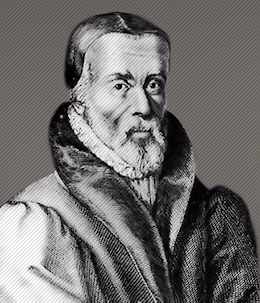Textus Receptus Bibles
William Tyndale Bible 1534
New Testament
| 4:1 | What shall we saye then that Abraham oure father as pertayninge to ye flesshe dyd finde? |
| 4:2 | If Abraham were iustified by dedes the hath he wherin to reioyce: but not with god. |
| 4:3 | For what sayth the scripture? Abraham beleved god and it was counted vnto him for rightewesnes. |
| 4:4 | To him that worketh is the rewarde not reckened of favour: but of duty. |
| 4:5 | To him that worketh not but beleveth on him that iustifieth the vngodly is his fayth counted for rightewesnes. |
| 4:6 | Even as David describeth the blessedfulnes of the man vnto whom god ascribeth rihgtewesnes without dedes. |
| 4:7 | Blessed are they whose vnrightewesnes are forgeven and whose synnes are covered. |
| 4:8 | Blessed is that ma to whom the Lorde imputeth not synne. |
| 4:9 | Came this blessednes then vpon the circumcised or vpon the vncircucised? We saye verely how that fayth was rekened to Abraham for rightewesnes. |
| 4:10 | How was it rekened? in the tyme of circumcision? or in the tyme before he was circumcised? Not in tyme of circucision: but when he was yet vncircumcised. |
| 4:11 | And he receaved the signe of circumcision as a seale of yt rightewesnes which is by fayth which fayth he had yet beynge vncircucised: that he shuld be the father of all them that beleve though they be not circumcised that rightewesnes myght be imputed to them also: |
| 4:12 | and that he myght be the father of the circumcised not because they are circumcised only: but because they walke also in the steppes of that fayth yt was in oure father Abraham before the tyme of circumcision. |
| 4:13 | For the promes that he shuld be the heyre of the worlde was not geven to Abraha or to his seed thorow the lawe: but thorow ye rightewesnes which cometh of fayth. |
| 4:14 | For yf they which are of the lawe be heyres then is fayth but vayne and the promes of none effecte. |
| 4:15 | Because the lawe causeth wrathe. For where no lawe is there is no trasgression. |
| 4:16 | Therfore by fayth is the inheritauce geven that it myght come of faveour: and the promes myght be sure to all the seed. Not to them only which are of the lawe: but also to them which are of the fayth of Abraham which is the father of vs all. |
| 4:17 | As it is wrytten: I have made the a father to many nacions even before god whom thou hast beleved which quyckeneth the deed and called those thinges which be not as though they were. |
| 4:18 | Which Abraham contrary to hope beleved in hope that he shuld be the father of many nacions accordynge to that which was spoken: |
| 4:19 | So shall thy seed be. And he faynted not in the fayth nor yet consydered hys awne body which was now deed even when he was almost an hondred yeare olde: nether yet that Sara was past chyldeberinge. |
| 4:20 | He stackered not at the promes of God thorow vnbelefe: but was made stronge in the fayth and gave honour to God |
| 4:21 | full certifyed that what he had promised that he was able to make good. |
| 4:22 | And therfore was it reckened to him for rightewesnes. |
| 4:23 | It is not written for him only that it was reckened to him for rightewesnes: |
| 4:24 | but also for vs to whom it shalbe counted for rightewesnes so we beleve on him that raysed vp Iesus oure Lorde from deeth. |
| 4:25 | Which was delivered for oure synnes and rose agayne forto iustifie vs. |

William Tyndale Bible 1534
William Tyndale was the first man to ever print the New Testament in the English language. Tyndale also went on to be the first to translate much of the Old Testament from the original Hebrew into English, but he was executed in 1536 for the "crime" of printing the scriptures in English before he could personally complete the printing of an entire Bible. His friends Myles Coverdale, and John [Thomas Matthew] Rogers, managed to evade arrest and publish entire Bibles in the English language for the first time, and within one year of Tyndale's death. These Bibles were primarily the work of William Tyndale.